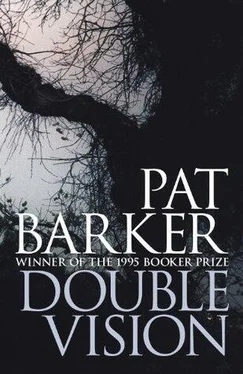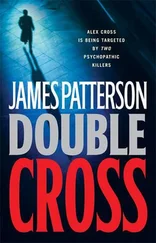‘Oh, I had one stroke of luck — thanks to Stephen — his agent’s taken me on.’
‘Good.’
‘He seems to be quite hopeful about placing the book.’
‘That is good news.’
He was less green about the gills than he’d been a few minutes ago. Looking at him, she came to a decision.
‘Would you like to see it?’ She jerked her head in the direction of the studio.
‘Love to.’ He was already on his feet.
‘I think it’s finished.’
‘Think?’
‘I need to stand back a bit.’
They walked across to the studio, Kate remembering the last time they’d been there together and reminding herself that he didn’t know she’d seen him. He stood in front of the figure for a long time, taking it in. He barely reached the top of its thighs. ‘Do you mind if I move the scaffold?’
‘No, go ahead.’
He pushed it away. Stood back again. ‘My God.’
She smiled. ‘If everybody says that, I’ve succeeded.’
No reply. She realized she’d sounded too flippant. It was always a problem at this point to remember the impact the finished work had on other people, because by this stage she felt nothing. Except tiredness, exasperation, the overwhelming desire to be shot of it.
She stepped right back, pretending to tidy up the tools she’d left lying on the trestle table by the door. Now that Peter was back, it felt as if he’d never left. Perhaps in a way he never had. Certainly she’d gone on thinking about him, had sensed him sometimes in the darkness between the white figures, the dark one, the shadow on the X-ray, who could never be counted no matter how often you looked. He’d insinuated himself so thoroughly into this process that she felt the figure was partly his. She hated thinking that, but inside there, buried as deep as bones in flesh, was the armature that he’d made. The carving was hers, but the shape was his.
Peter turned to her. ‘He hasn’t forgotten anything, has he? Betrayal, torture. Murder. And none of it matters.’
He thought it was about memory. That was interesting, but she didn’t want to talk about it. She didn’t even want to look at the figure with him standing there, in case his response contaminated hers.
At last he turned away.
‘So what happens now?’ he asked, as they walked out to his van.
‘It goes to the foundry. I’ll work on it a bit more after it’s cast, and then it’s off to the cathedral.’
‘It’ll leave an awfully big gap. What’ll you do?’
‘ Live .’
They shook hands and she watched him walk away. Big hungry strides crunching the gravel, then the familiar cough and sputter of the engine starting up.
From all over the island now little groups of people were making their way back to the landing stage via the tourist information point at the top of the hill, where they bought postcards and film for their cameras. No experience is valid without the accompanying image, Stephen thought, though he bought a postcard of the puffins too.
Then they walked down the hill, enduring further attacks from the terns at every step of the way, and found places in the bow of the boat. The mist was rolling in again, darkening the sea, muffling sounds, like a pad soaked in chloroform pressed down suddenly over nose and mouth. They had to wait for the final passengers. By the time they arrived, breathless, apologetic, holding newspapers over their heads to shield themselves from dive-bombing terns, the mist was thicker than it had been on the journey out. As the boat cast off from the jetty and turned towards land, there was no longer the sensation of steering between high black cliffs, but instead of being alone, wrapped about with clammy white draperies of mist, on the cold, heaving, relentless sea.
At some point Stephen became aware that the two freckly Vikings who owned the boat were worried. He didn’t know how many of the other passengers had noticed, but certainly something was wrong. One of the brothers was on the radio speaking to somebody on the mainland, and after he’d finished there was a muffled, earnest conversation between them. On Stephen’s right were the parents of the little girl who’d been frightened by the terns. Lowering his voice so they couldn’t hear, he said, ‘They’re in trouble.’
Justine smiled faintly and, also whispering, replied, ‘Yes, I know.’
A few hundred yards further on, the ghostly chromatic cry of a black-backed gull startled them as it appeared from the sky, flashed briefly white above their heads, and vanished into the mist. A second later there was a shuddering of the whole boat and a scraping sound as its keel hit submerged rocks. Everybody looked round with startled stares, for the moment half amused rather than frightened, but then the jar and shudder came again and a sense of something being badly wrong spread round the boat. A small woman with dry chestnut hair clutched her husband’s arm. A group of young men further along seemed more inclined to treat it as a joke.
‘Can you swim?’ he asked Justine.
Keeping her voice light, she said, ‘Like a fish, but there are seven kids, and some of them probably can’t.’
The water would be cold. He doubted if even a strong swimmer would last long. Oh, but it was ridiculous. People don’t die on days out at the seaside, they die in wars, terrorist attacks, all the bloody stupid inane events he’d spent his life covering. He met the gaze of the little girl’s father and they exchanged a flaring of eyebrows. The mother had gone very white, but the little girl prattled on, playing with a plastic pony with a purple mane. This is a wake-up call, he thought. Or a go-to-sleep call, his brain replied, indifferent. He recognized that indifference, the feeling of his life balanced like a feather on the palm of his hand. But then he looked at Justine and thought, no. Not yet.
For a third time the boat scraped across submerged rocks. The brothers made another call to land, and the boat changed direction. Five minutes later, the arm of the harbour became visible as a band of deeper grey in the all-encompassing mist. A hundred yards further on, they could see a huddle of houses, all with their lights on, as the little town gathered around its firesides and contended with the early dark.
Slowly, people started to talk. ‘Sea fret,’ somebody said. ‘Have you noticed they’ve started calling it “the haar” on the telly?’ A rumble of contempt. Just what a cartload of southern poofs would call it. Apparently, sea-fret was a north-east coast speciality, and now it wasn’t actually threatening to kill them they were becoming fond of it again.
Once on dry land, the passengers dispersed rapidly, a group of people momentarily united by danger indifferent to each other again, strangers.
‘That was a bit too eventful for my liking,’ Stephen said, as they walked away from the boat.
‘What, after Bosnia? I don’t believe you.’
‘I’m afraid of drowning.’
It was true. From childhood he’d had a horror of inchoate depths, full of things that nibble off toes and eyelids. He could even remember what had sparked the fear: the wreck of a boat near Slaughden Quay in Aldeburgh, where they’d gone for their half-term holidays. In fine weather the boat’s greying wood was a familiar landmark, but, coming home from a walk one dark and stormy afternoon, he’d seen it in a different light, cold and slimy, with the river water rising remorselessly over its rotting timbers. Something about it terrified him, and he’d run all the way back to their rented cottage. How old would he have been? Seven, eight? Couldn’t have been more than that.
‘I could do with a drink,’ Justine said. ‘What about you?’
They found a hotel with a public bar and settled down with glasses of whisky over a log fire. They had the bar almost to themselves, except for a noisy crowd of golfers at the other end, who’d abandoned the attempt to play and were drinking determinedly instead. Apart from them, the hotel seemed to be empty. Stephen was glad of the noise because under cover of that boisterous and extroverted chatter he and Justine could talk casually, or not talk at all and just stare into the flames.
Читать дальше












